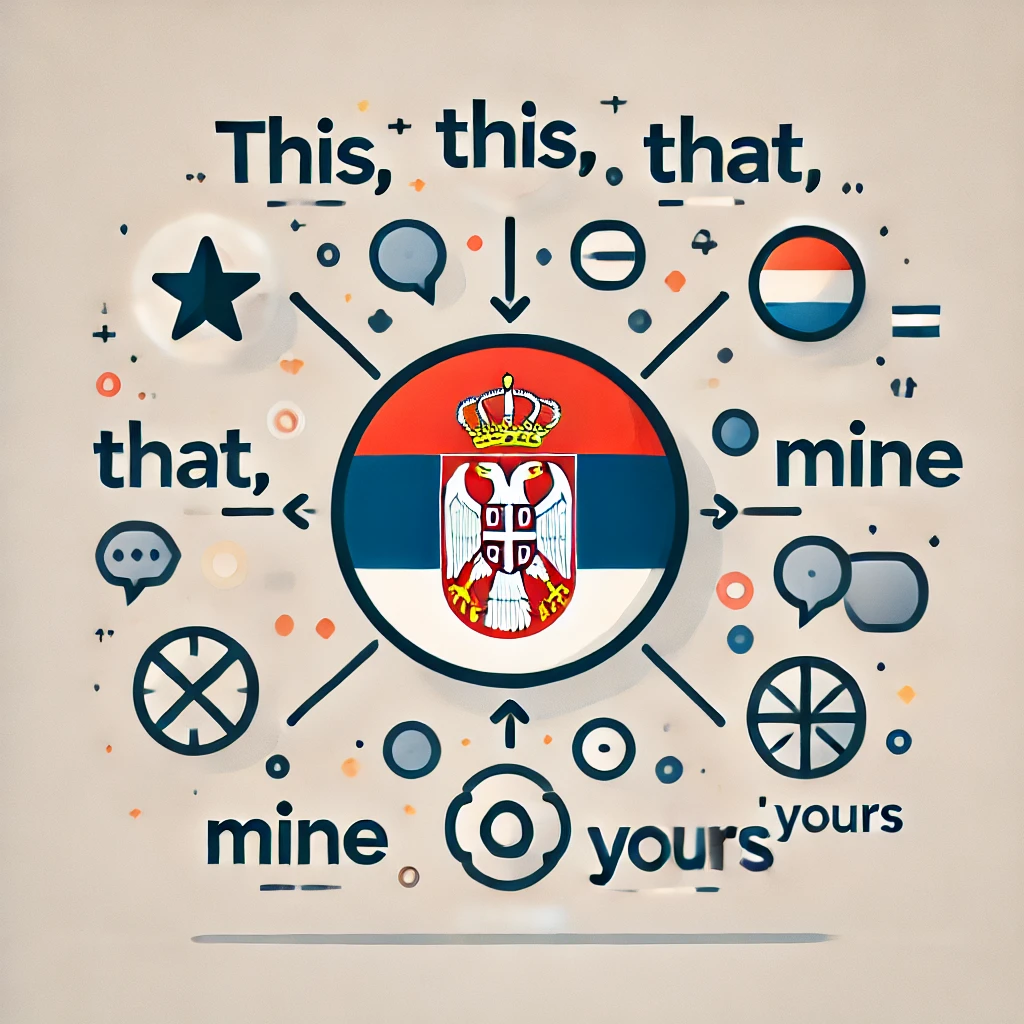Serbian Possessive & Demonstrative Pronouns

Understanding Possessive and Demonstrative Pronouns in Serbian
Learning possessive and demonstrative pronouns is essential because they help you talk about ownership and point out specific things. In Serbian, these pronouns might seem a bit tricky due to the rules involved. However, once you understand gender in Serbian nouns, it’ll become much easier.
What Does Gender Mean in Serbian?
In Serbian, every noun has a gender: masculine, feminine, or neuter. This isn’t about being male or female in a literal sense. Instead, it’s a way to group nouns. Knowing the gender is important because it affects how you use other words with that noun, like adjectives and pronouns.
Learn More About Gender in Serbian
Possessive Pronouns in Serbian
Possessive pronouns show ownership, like “my,” “your,” or “their” in English. In Serbian, these pronouns change form based on the gender and number (singular or plural) of the noun they’re linked to.
| English | Masculine | Feminine | Neuter | |||
|---|---|---|---|---|---|---|
| Singular | Plural | Singular | Plural | Singular | Plural | |
| my | moj | moji | moja | moje | moje | moja |
| your (sing.) | tvoj | tvoji | tvoja | tvoje | tvoje | tvoja |
| his/its | njegov | njegovi | njegova | njegove | njegovo | njegova |
| her | njen | njeni | njena | njene | njeno | njena |
| our | naš | naši | naša | naše | naše | naša |
| your (pl.) | vaš | vaši | vaša | vaše | vaše | vaša |
| their | njihov | njihovi | njihova | njihove | njihovo | njihova |
Notice how the forms change depending on the gender and number of the noun.
Examples
Let’s see how these possessive pronouns work with different nouns.
Masculine Noun: “telefon” (phone)
- Singular:
- my phone: moj telefon
- your phone (s): tvoj telefon
- his phone: njegov telefon
- her phone: njen telefon
- our phone: naš telefon
- your phone (pl.): vaš telefon
- their phone: njihov telefon
- Plural (“telefoni”):
- my phones: moji telefoni
- your phones: tvoji telefoni
- his phones: njegovi telefoni
- her phones: njeni telefoni
- our phones: naši telefoni
- your phones (pl.): vaši telefoni
- their phones: njihovi telefoni
Feminine Noun: “kuća” (house)
- Singular:
- my house: moja kuća
- your house: tvoja kuća
- his house: njegova kuća
- her house: njena kuća
- our house: naša kuća
- your house (pl.): vaša kuća
- their house: njihova kuća
- Plural (“kuće”):
- my houses: moje kuće
- your houses: tvoje kuće
- his houses: njegove kuće
- her houses: njene kuće
- our houses: naše kuće
- your houses (pl.): vaše kuće
- their houses: njihove kuće
Neuter Noun: “ogledalo” (mirror)
- Singular:
- my mirror: moje ogledalo
- your mirror: tvoje ogledalo
- his mirror: njegovo ogledalo
- her mirror: njeno ogledalo
- our mirror: naše ogledalo
- your mirror (pl.): vaše ogledalo
- their mirror: njihovo ogledalo
- Plural (“ogledala”):
- my mirrors: moja ogledala
- your mirrors: tvoja ogledala
- his mirrors: njegova ogledala
- her mirrors: njena ogledala
- our mirrors: naša ogledala
- your mirrors (pl.): vaša ogledala
- their mirrors: njihova ogledala
Demonstrative Pronouns in Serbian
Demonstrative pronouns are words like “this” and “that,” used to point out specific things. In Serbian, these pronouns also change based on the noun’s gender and number.
| English | Masculine | Feminine | Neuter | |||
|---|---|---|---|---|---|---|
| Singular | Plural | Singular | Plural | Singular | Plural | |
| this | ovaj | ovi | ova | ove | ovo | ova |
| that (near listener) | taj | ti | ta | te | to | ta |
| that (far away) | onaj | oni | ona | one | ono | ona |
Examples
Masculine Noun: “telefon” (phone)
- Singular:
- this phone: ovaj telefon
- that phone (near): taj telefon
- that phone (far): onaj telefon
- Plural (“telefoni”):
- these phones: ovi telefoni
- those phones (near): ti telefoni
- those phones (far): oni telefoni
Feminine Noun: “kuća” (house)
- Singular:
- this house: ova kuća
- that house (near): ta kuća
- that house (far): ona kuća
- Plural (“kuće”):
- these houses: ove kuće
- those houses (near): te kuće
- those houses (far): one kuće
Neuter Noun: “ogledalo” (mirror)
- Singular:
- this mirror: ovo ogledalo
- that mirror (near): to ogledalo
- that mirror (far): ono ogledalo
- Plural (“ogledala”):
- these mirrors: ova ogledala
- those mirrors (near): ta ogledala
- those mirrors (far): ona ogledala
Final Thoughts
As you’ve seen, understanding gender in Serbian is crucial before moving on to possessive and demonstrative pronouns. The forms of these pronouns change to match the gender and number of the nouns they’re used with. By mastering the gender rules, you’ll find it much easier to use these pronouns correctly.
Tip: If you’re not familiar with the gender rules yet, take some time to learn them first. It’ll make learning the rest of Serbian grammar much smoother.


